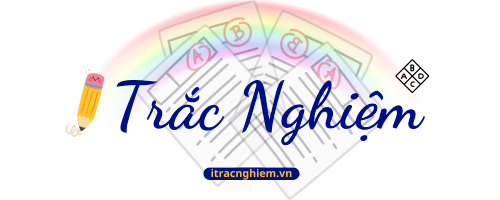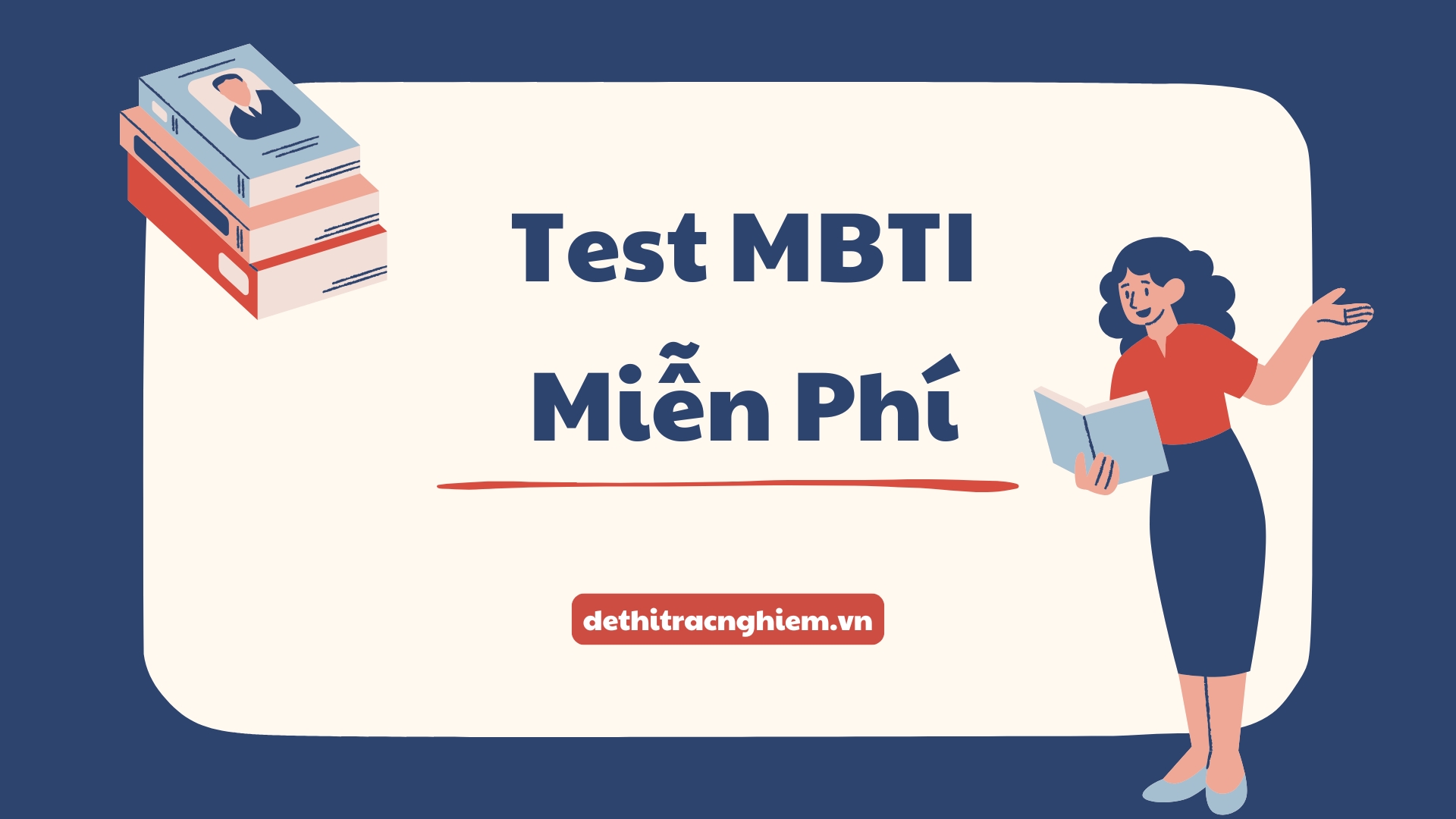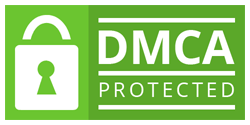Đề thi thử Đại học 2025 môn Tiếng Anh – Sở GD&ĐT Quảng Ninh lần 2 là một trong những đề tiêu biểu thuộc Tổng hợp đề thi thử môn Tiếng Anh THPT QG, nằm trong chương trình Đề thi vào Đại học. Đây là đề thi thử lần 2 được tổ chức bởi Sở Giáo dục và Đào tạo tỉnh Quảng Ninh, với mục tiêu giúp học sinh lớp 12 tiếp tục rèn luyện kỹ năng làm bài và đánh giá năng lực qua từng giai đoạn ôn thi trước kỳ thi tốt nghiệp THPT năm 2025.
Đề thi được thiết kế sát với cấu trúc chuẩn của Bộ GD&ĐT, gồm đầy đủ các phần: phát âm – trọng âm, từ vựng – ngữ pháp, chức năng giao tiếp, tìm lỗi sai, đọc điền, đọc hiểu và viết lại câu. Các chủ điểm ngữ pháp trọng tâm như câu điều kiện, mệnh đề quan hệ, thì động từ, câu bị động, đảo ngữ, liên từ – giới từ, collocations và idioms được lồng ghép hợp lý. Phần đọc hiểu được xây dựng với độ khó vừa phải đến nâng cao, phù hợp để phân loại học sinh, từ mức trung bình khá đến giỏi.
Hãy cùng Dethitracnghiem.vn tìm hiểu về đề thi này và tham gia làm kiểm tra ngay lập tức!
- Số trang: 4 trang
- Hình thức: Trắc nghiệm
- Thời gian làm bài: 50 phút (không kể thời gian phát đề)
ĐỀ THI THỬ ĐẠI HỌC MÔN TIẾNG ANH NĂM 2025 SỞ GD&ĐT QUẢNG NINH LẦN 2
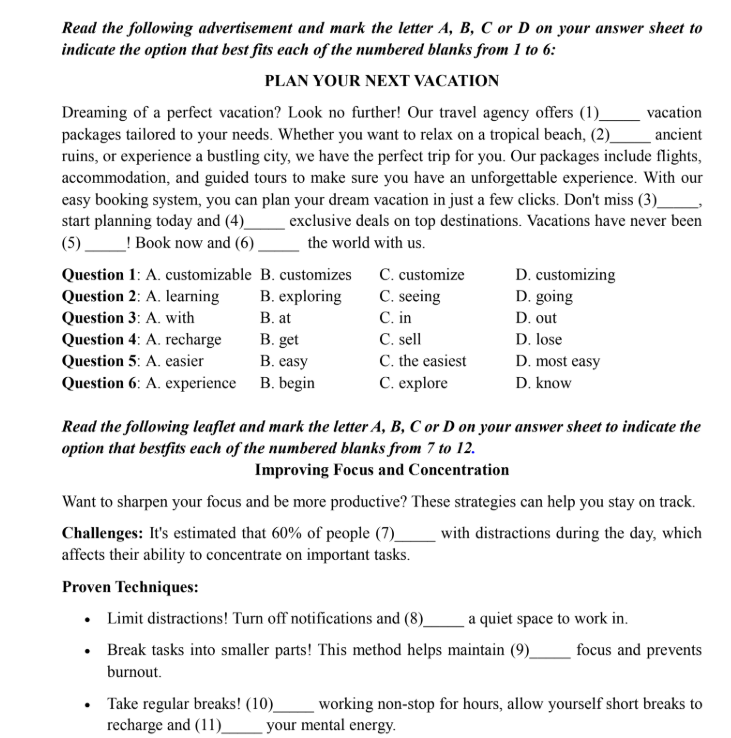
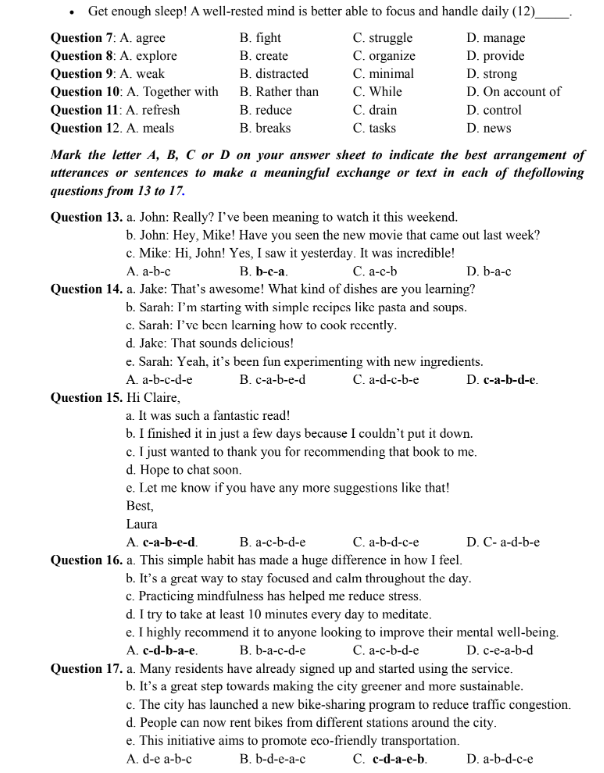
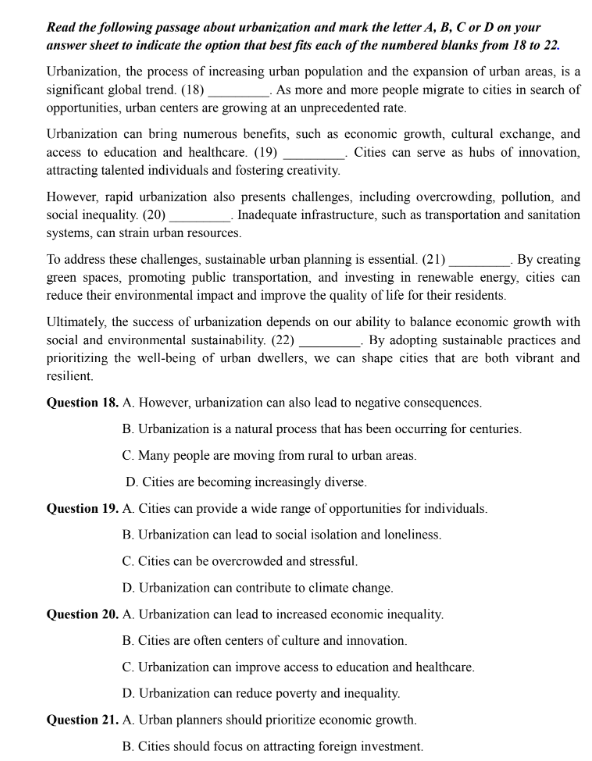
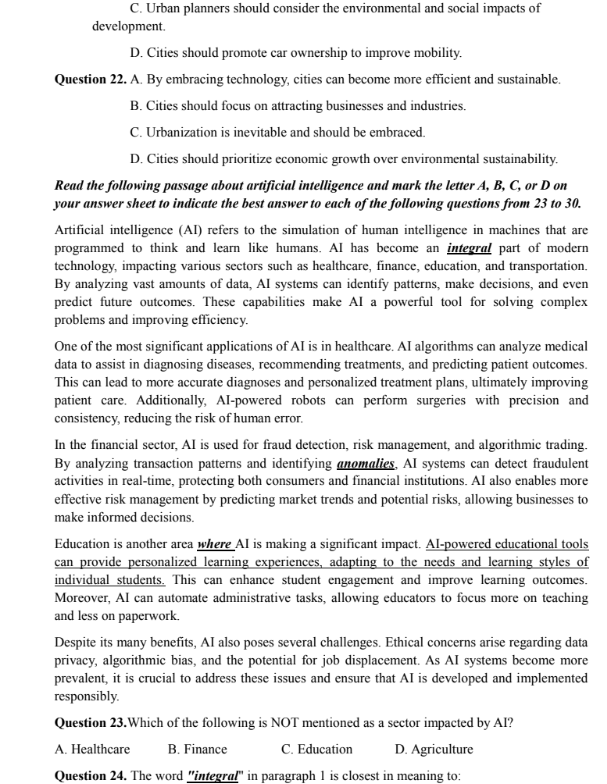
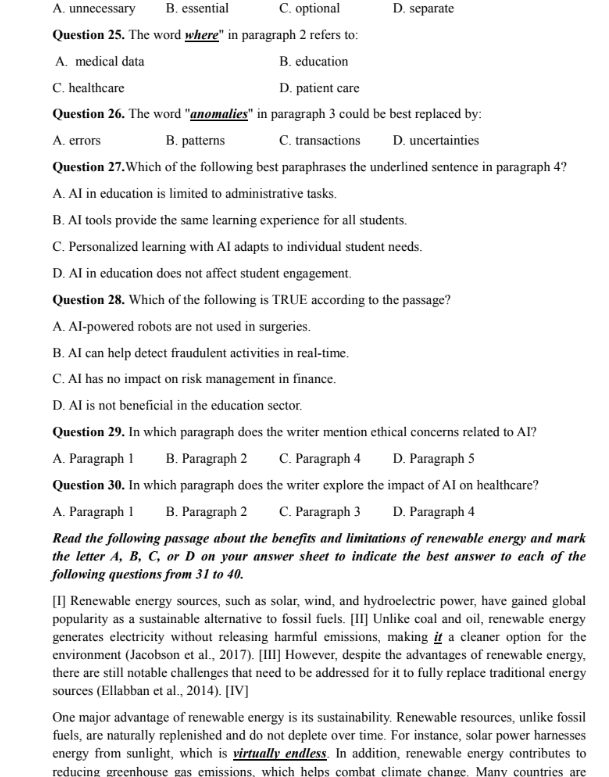
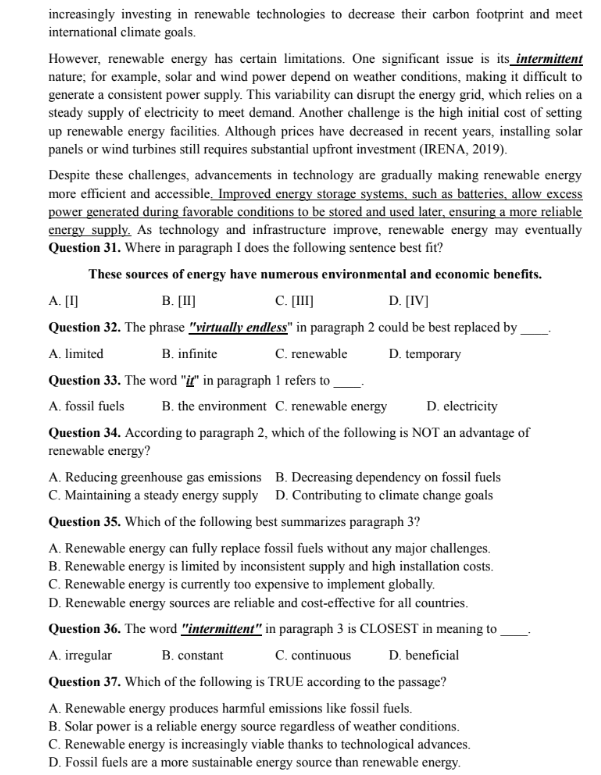
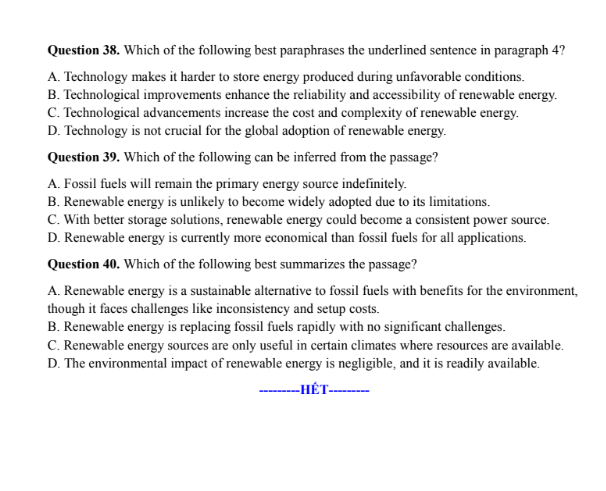
Read the following advertisement and mark the letter A, B, C or D on your answer sheet to indicate the option that best fits each of the numbered blanks from 1 to 6:
PLAN YOUR NEXT VACATION
Dreaming of a perfect vacation? Look no further! Our travel agency offers (1) _______ vacation packages tailored to your needs. Whether you want to relax on a tropical beach, (2) _______ ancient ruins, or experience a bustling city, we have the perfect trip for you. Our packages include flights, accommodation, and guided tours to make sure you have an unforgettable experience. With our easy booking system, you can plan your dream vacation in just a few clicks. Don’t miss (3) _______, start planning today and (4) _______ exclusive deals on top destinations. Vacations have never been (5) _______! Book now and (6) _______ the world with us.
Question 1:
A. customizable
B. customizes
C. customize
D. customizing
Question 2:
A. learning
B. exploring
C. seeing
D. going
Question 3:
A. with
B. at
C. in
D. out
Question 4:
A. recharge
B. get
C. sell
D. lose
Question 5:
A. easier
B. easy
C. the easiest
D. most easy
Question 6:
A. experience
B. begin
C. explore
D. know
Read the following leaflet and mark the letter A, B, C or D on your answer sheet to indicate the option that bestfits each of the numbered blanks from 7 to 12.
Improving Focus and Concentration
Want to sharpen your focus and be more productive? These strategies can help you stay on track.
Challenges: It’s estimated that 60% of people (7) _______ with distractions during the day, which affects their ability to concentrate on important tasks.
Proven Techniques:
Limit distractions! Turn off notifications and (8) _______ a quiet space to work in.
Break tasks into smaller parts! This method helps maintain (9) _______ focus and prevents burnout.
Take regular breaks! (10) _______ working non-stop for hours, allow yourself short breaks to recharge and (11) _______ your mental energy.
Get enough sleep! A well-rested mind is better able to focus and handle daily (12) _______.
Question 7:
A. agree
B. fight
C. struggle
D. manage
Question 8:
A. explore
B. create
C. organize
D. provide
Question 9:
A. weak
B. distracted
C. minimal
D. strong
Question 10:
A. Together with
B. Rather than
C. While
D. On account of
Question 11:
A. refresh
B. reduce
C. drain
D. control
Question 12:
A. meals
B. breaks
C. tasks
D. news
Mark the letter A, B, C or D on your answer sheet to indicate the best arrangement of utterances or sentences to make a meaningful exchange or text in each of thefollowing questions from 13 to 17.
Question 13:
a. John: Really? I’ve been meaning to watch it this weekend.
b. John: Hey, Mike! Have you seen the new movie that came out last week?
c. Mike: Hi, John! Yes, I saw it yesterday. It was incredible!
A. a-b-c
B. b-c-a
C. a-c-b
D. b-a-c
Question 14:
a. Jake: That’s awesome! What kind of dishes are you learning?
b. Sarah: I’m starting with simple recipes like pasta and soups.
c. Sarah: I’ve been learning how to cook recently.
d. Jake: That sounds delicious!
e. Sarah: Yeah, it’s been fun experimenting with new ingredients.
A. a-b-c-d-e
B. c-a-b-d-e
C. a-d-c-b-e
D. c-a-b-d-e
Question 15:
Hi Claire,
a. It was such a fantastic read!
b. I finished it in just a few days because I couldn’t put it down.
c. I just wanted to thank you for recommending that book to me.
d. Hope to chat soon.
e. Let me know if you have any more suggestions like that!
Best,
Laura
A. c-a-b-e-d
B. a-c-b-d-e
C. a-b-d-c-e
D. c- a-d-b-e
Question 16:
a. This simple habit has made a huge difference in how I feel.
b. It’s a great way to stay focused and calm throughout the day.
c. Practicing mindfulness has helped me reduce stress.
d. I try to take at least 10 minutes every day to meditate.
e. I highly recommend it to anyone looking to improve their mental well-being.
A. c-d-b-a-e
B. b-a-c-d-e
C. a-c-b-d-e
D. c-c-a-b-d
Question 17:
a. Many residents have already signed up and started using the service.
b. It’s a great step towards making the city greener and more sustainable.
c. The city has launched a new bike-sharing program to reduce traffic congestion.
d. People can now rent bikes from different stations around the city.
e. This initiative aims to promote eco-friendly transportation.
A. d-e a-b-c
B. b-d-e-a-c
C. c-d-e-b-a
D. a-b-d-c-e
Read the following passage about urbanization and mark the letter A, B, C or D on your answer sheet to indicate the option that best fits each of the numbered blanks from 18 to 22.
Urbanization, the process of increasing urban population and the expansion of urban areas, is a significant global trend. (18) _______ As more and more people migrate to cities in search of opportunities, urban centers are growing at an unprecedented rate.
Urbanization can bring numerous benefits, such as economic growth, cultural exchange, and access to education and healthcare. (19) _______ Cities can serve as hubs of innovation, attracting talented individuals and fostering creativity.
However, rapid urbanization also presents challenges, including overcrowding, pollution, and social inequality. (20) _______ Inadequate infrastructure, such as transportation and sanitation systems, can strain urban resources.
To address these challenges, sustainable urban planning is essential. (21) _______ By creating green spaces, promoting public transportation, and investing in renewable energy, cities can reduce their environmental impact and improve the quality of life for their residents.
Ultimately, the success of urbanization depends on our ability to balance economic growth with social and environmental sustainability. (22) _______ By adopting sustainable practices and prioritizing the well-being of urban dwellers, we can shape cities that are both vibrant and resilient.
Question 18:
A. However, urbanization can also lead to negative consequences.
B. Urbanization is a natural process that has been occurring for centuries.
C. Many people are moving from rural to urban areas.
D. Cities are becoming increasingly diverse.
Question 19:
A. Cities can provide a wide range of opportunities for individuals.
B. Urbanization can lead to social isolation and loneliness.
C. Cities can be overcrowded and stressful.
D. Urbanization can contribute to climate change.
Question 20:
A. Urbanization can lead to increased economic inequality.
B. Cities are often centers of culture and innovation.
C. Urbanization can improve access to education and healthcare.
D. Urbanization can reduce poverty and inequality.
Question 21:
A. Urban planners should prioritize economic growth.
B. Cities should focus on attracting foreign investment.
C. Urban planners should consider the environmental and social impacts of development.
D. Cities should promote car ownership to improve mobility.
Question 22:
A. By embracing technology, cities can become more efficient and sustainable.
B. Cities should focus on attracting businesses and industries.
C. Urbanization is inevitable and should be embraced.
D. Cities should prioritize economic growth over environmental sustainability.
Read the following passage about artificial intelligence and mark the letter A, B, C, or D on your answer sheet to indicate the best answer to each of the following questions from 23 to 30.
Artificial intelligence (AI) refers to the simulation of human intelligence in machines that are programmed to think and learn like humans. AI has become an integral part of modern technology, impacting various sectors such as healthcare, finance, education, and transportation. By analyzing vast amounts of data, AI systems can identify patterns, make decisions, and even predict future outcomes. These capabilities make AI a powerful tool for solving complex problems and improving efficiency.
One of the most significant applications of AI is in healthcare. AI algorithms can analyze medical data to assist in diagnosing diseases, recommending treatments, and predicting patient outcomes. This can lead to more accurate diagnoses and personalized treatment plans, ultimately improving patient care. Additionally, AI-powered robots can perform surgeries with precision and consistency, reducing the risk of human error.
In the financial sector, AI is used for fraud detection, risk management, and algorithmic trading. By analyzing transaction patterns and identifying anomalies, AI systems can detect fraudulent activities in real-time, protecting both consumers and financial institutions. AI also enables more effective risk management by predicting market trends and potential risks, allowing businesses to make informed decisions.
Education is another area where AI is making a significant impact. AI-powered educational tools can provide personalized learning experiences, adapting to the needs and learning styles of individual students. This can enhance student engagement and improve learning outcomes. Moreover, AI can automate administrative tasks, allowing educators to focus more on teaching and less on paperwork.
Despite its many benefits, AI also poses several challenges. Ethical concerns arise regarding data privacy, algorithmic bias, and the potential for job displacement. As AI systems become more prevalent, it is crucial to address these issues and ensure that AI is developed and implemented responsibly.
Question 23: Which of the following is NOT mentioned as a sector impacted by AI?
A. Healthcare
B. Finance
C. Education
D. Agriculture
Question 24: The word “integral” in paragraph 1 is closest in meaning to:
A. unnecessary
B. essential
C. optional
D. separate
Question 25: The word “where” in paragraph 4 refers to:
A. medical data
B. education
C. healthcare
D. patient care
Question 26: The word “anomalies” in paragraph 3 could be best replaced by:
A. errors
B. patterns
C. transactions
D. uncertainties
Question 27: Which of the following best paraphrases the underlined sentence in paragraph 4?
A. AI in education is limited to administrative tasks.
B. AI tools provide the same learning experience for all students.
C. Personalized learning with AI adapts to individual student needs.
D. AI in education does not affect student engagement.
Question 28: Which of the following is TRUE according to the passage?
A. AI-powered robots are not used in surgeries.
B. AI can help detect fraudulent activities in real-time.
C. AI has no impact on risk management in finance.
D. AI is not beneficial in the education sector.
Question 29: In which paragraph does the writer mention ethical concerns related to AI?
A. Paragraph 1
B. Paragraph 2
C. Paragraph 4
D. Paragraph 5
Question 30: In which paragraph does the writer explore the impact of AI on healthcare?
A. Paragraph 1
B. Paragraph 2
C. Paragraph 3
D. Paragraph 4
Read the following passage about the benefits and limitations of renewable energy and mark the letter A, B, C, or D on your answer sheet to indicate the best answer to each of the following questions from 31 to 40.
[I] Renewable energy sources, such as solar, wind, and hydroelectric power, have gained global popularity as a sustainable alternative to fossil fuels. [II] Unlike coal and oil, renewable energy generates electricity without releasing harmful emissions, making it a cleaner option for the environment (Jacobson et al., 2017). [III] However, despite the advantages of renewable energy, there are still notable challenges that need to be addressed for it to fully replace traditional energy sources (Ellabban et al., 2014). [IV]
One major advantage of renewable energy is its sustainability. Renewable resources, unlike fossil fuels, are naturally replenished and do not deplete over time. For instance, solar power harnesses energy from sunlight, which is virtually endless. In addition, renewable energy contributes to reducing greenhouse gas emissions, which helps combat climate change. Many countries are increasingly investing in renewable energy technologies to decrease their carbon footprint and meet international climate goals.
However, renewable energy has certain limitations. One significant issue is its intermittent nature; for example, solar and wind power depend on weather conditions, making it difficult to generate a consistent power supply. This variability can disrupt the energy grid, which relies on a steady supply of electricity to meet demand. Another challenge is the high initial cost of setting up renewable energy facilities. Although prices have decreased in recent years, installing solar panels or wind turbines still requires substantial upfront investment (IRENA, 2019).
Despite these challenges, advancements in technology are gradually making renewable energy more efficient and accessible. Improved energy storage systems, such as batteries, allow excess power generated during favorable conditions to be stored and used later, ensuring a more reliable energy supply. As technology and infrastructure improve, renewable energy may eventually
Question 31: Where in paragraph 1 does the following sentence best fit?
“These sources of energy have numerous environmental and economic benefits.”
A. [I]
B. [II]
C. [III]
D. [IV]
Question 32: The phrase “virtually endless” in paragraph 2 could be best replaced by _______.
A. limited
B. infinite
C. renewable
D. temporary
Question 33: The word “it” in paragraph 1 refers to _______.
A. fossil fuels
B. the environment
C. renewable energy
D. electricity
Question 34: According to paragraph 2, which of the following is NOT an advantage of renewable energy?
A. Reducing greenhouse gas emissions
B. Decreasing dependency on fossil fuels
C. Maintaining a steady energy supply
D. Contributing to climate change goals
Question 35: Which of the following best summarizes paragraph 3?
A. Renewable energy can fully replace fossil fuels without any major challenges.
B. Renewable energy is limited by inconsistent supply and high installation costs.
C. Renewable energy is currently too expensive to implement globally.
D. Renewable energy sources are reliable and cost-effective for all countries.
Question 36: The word “intermittent” in paragraph 3 is CLOSEST in meaning to _______.
A. irregular
B. constant
C. continuous
D. beneficial
Question 37: Which of the following is TRUE according to the passage?
A. Renewable energy produces harmful emissions like fossil fuels.
B. Solar power is a reliable energy source regardless of weather conditions.
C. Renewable energy is increasingly viable thanks to technological advances.
D. Fossil fuels are a more sustainable energy source than renewable energy.
Question 38: Which of the following best paraphrases the underlined sentence in paragraph 4?
A. Technology makes it harder to store energy produced during unfavorable conditions.
B. Technological improvements enhance the reliability and accessibility of renewable energy.
C. Technological advancements increase the cost and complexity of renewable energy.
D. Technology is not crucial for the global adoption of renewable energy.
Question 39: Which of the following can be inferred from the passage?
A. Fossil fuels will remain the primary energy source indefinitely.
B. Renewable energy is unlikely to become widely adopted due to its limitations.
C. With better storage solutions, renewable energy could become a consistent power source.
D. Renewable energy is currently more economical than fossil fuels for all applications.
Question 40: Which of the following best summarizes the passage?
A. Renewable energy is a sustainable alternative to fossil fuels with benefits for the environment, though it faces challenges like inconsistency and setup costs.
B. Renewable energy is replacing fossil fuels rapidly with no significant challenges.
C. Renewable energy sources are only useful in certain climates where resources are available.
D. The environmental impact of renewable energy is negligible, and it is readily available.
Mục đích tổ chức kỳ thi Đại học năm 2025 là gì?
Căn cứ theo quy chế hiện hành của Bộ Giáo dục và Đào tạo và các văn bản hướng dẫn tổ chức kỳ thi Đại học năm 2025, mục đích của kỳ thi là:
– Đánh giá kết quả học tập của học sinh sau 12 năm học theo yêu cầu của chương trình giáo dục phổ thông.
– Lấy kết quả thi để xét công nhận tốt nghiệp trung học phổ thông và làm căn cứ tuyển sinh đại học, cao đẳng.
– Góp phần đánh giá chất lượng giáo dục của địa phương và cả nước, làm cơ sở điều chỉnh nội dung, phương pháp dạy học trong nhà trường.
Thí sinh thi Đại học năm 2025 có bắt buộc thi môn Tiếng Anh không?
Theo quy định hiện hành của Bộ Giáo dục và Đào tạo và hướng dẫn tổ chức kỳ thi tốt nghiệp Đại học năm 2025, thí sinh dự thi phải thực hiện như sau:
– Thi 3 môn bắt buộc: Toán, Ngữ văn và Ngoại ngữ.
– Ngoài ra, thí sinh phải chọn một trong hai bài thi tổ hợp: Khoa học Tự nhiên (gồm các môn Vật lí, Hóa học, Sinh học) hoặc Khoa học Xã hội (gồm các môn Lịch sử, Địa lí, Giáo dục công dân – dành cho học sinh học chương trình giáo dục phổ thông).
Trong số các môn thi, Tiếng Anh là một trong ba môn thuộc bài thi Ngoại ngữ bắt buộc, thí sinh phải thi môn Tiếng Anh như một môn bắt buộc, không phụ thuộc vào lựa chọn bài thi tổ hợp hay mục đích xét tuyển đại học.
Như vậy, kỳ thi Đại học năm 2025 bắt buộc thí sinh phải thi môn Tiếng Anh.
